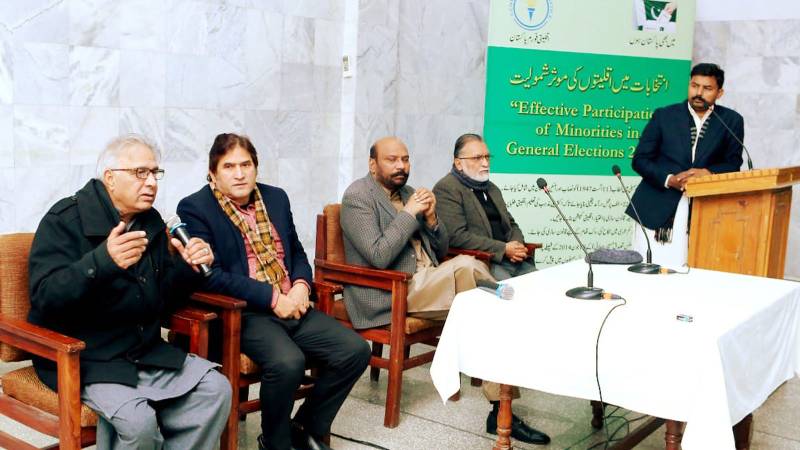
The Centre for Social Justice (CSJ) and Minority Forum Pakistan organized a seminar titled "Effective Participation of Minorities in Elections" held in Lahore, wherein the representatives of the political parties presented the positions of their parties regarding minorities' rights and agreed to take practical steps to address the outstanding issues faced by minorities.
CSJ Executive Director Peter Jacob, Jamaat Islami (JI) leader Zia Uddin Ansari, PML-N leader Tariq Javed Tariq, and PTI leader Habqooq Gill (PTI) addressed the seminar. Yasar Talib moderated the discussion, while Tayyaba Rafiq and Nasir William presented the findings of the assessment report regarding political parties’ manifestos and introduction to the minority rights campaign "Main Bhi Pakistan Hun"—I am Pakistan—launched in connection with the 2024 general elections.
On the occasion, Peter Jacob stated that rigid revolutions weaken institutions and political systems in countries; therefore, soft revolutions through reforms can be instrumental in strengthening accountability, institutions, and democracy. He said that public representatives associated with political parties require public opinion and support to introduce legislation regarding any matter concerning human rights. The public's mindset and style of politics should also be improved so that the public can keep an eye on the progress of political representatives and convince them to take steps to address human rights challenges.
A representative of PTI, Habqooq Gill, expressed his commitment to take meaningful actions to strengthen affirmative measures and address the human rights challenges faced by minorities.
A representative of PML-N, Tariq Javaid Tariq said that the concerns of minorities and other marginalized groups are often overlooked by political parties, which results in the non-consideration of progressive bills. The legislative bodies won’t be able to effectively address human rights challenges unless minority perspectives are paid heed to.
A representative of JI, Ziauddin Ansari, stated that pledges in the election manifestos of political parties remain unfilled, which makes the issues unaddressed. Consistent efforts are required to change the priorities of political parties to address the deprivation and marginalization of communities and promote democratic culture, he added.
Tayyaba Rafiq presented five-point demands regarding minorities' rights, which include strengthening the law to end child marriage, introducing a law to criminalize forced religious conversion, establishing a committee to implement the Jillani Judgment issued on June 19, 2014, removing religious content from the curriculum and non-religious textbooks to comply with Article 22(1) of the Constitution of Pakistan, establishing a statutory minorities rights commission, and including Quaid-e-Azam's address of August 11, 1947 in the curriculum and the Constitution of Pakistan, which the participants, including political workers and representatives of civil society groups, endorsed.
Nasir William presented the findings of the manifest assessment report “Promises to Keep and Miles to Go” regarding the assessment of the delivery of the pledges about minorities’ rights in election manifestos and stated that political parties have failed to take effective actions to fulfill the pledges they make before elections.
The campaign "Main Bhi Pakistan Hun" not only awakens public opinion regarding the demands but also reminds the political parties of the promises made in the election manifesto regarding minorities' rights and demands concrete measures to address issues faced by minorities. Under the campaign around elections, 650 banners displaying the demands were hung in the streets, and fifty community-level corner meetings were held across Pakistan. Thirty advocacy meetings with election contestants and ten lobby meetings with political leaders were held, while two Awami Assemblies in Mirpur Khas and Quetta and five district-level seminars in Punjab and Sindh were organized, which were attended by politicians from various parties who pledged to incorporate the proposed demands into their respective manifestos and strengthen affirmative measures to address issues.
